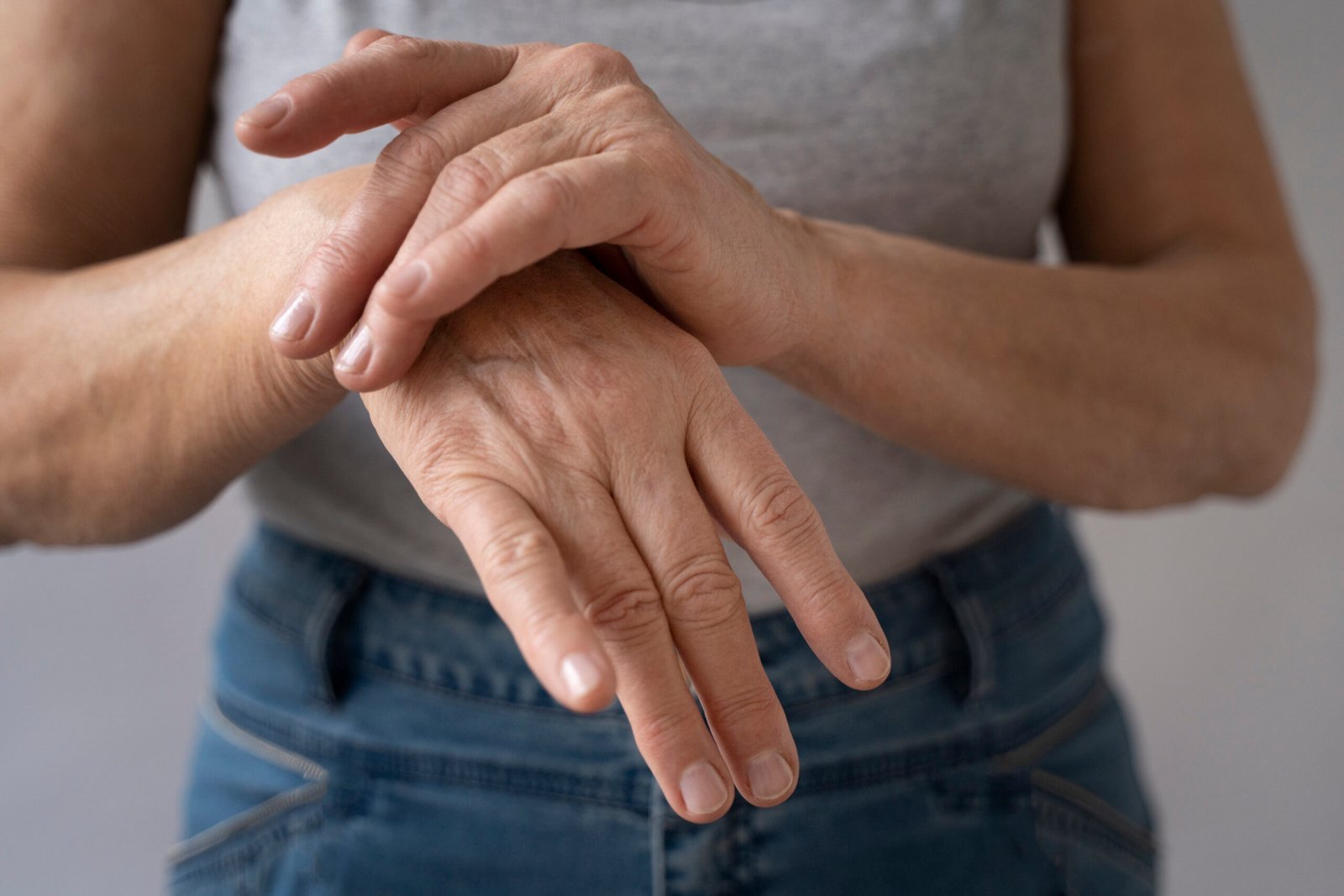
Rheumatoid Arthritis (RA) is a chronic autoimmune condition that causes inflammation, pain, and stiffness in the joints. The condition can progressively worsen, leading to significant discomfort and reduced mobility. While traditional treatments for RA include nonsteroidal anti-inflammatory drugs (NSAIDs), corticosteroids, and disease-modifying antirheumatic drugs (DMARDs), many patients are exploring alternative therapies, such as medical cannabis, to manage their symptoms.
With medical cannabis legally available in Oklahoma, patients with chronic conditions like RA can now access cannabis to help reduce pain, inflammation, and improve their quality of life. In this article, we will discuss how cannabis may help manage Rheumatoid Arthritis symptoms, the scientific research supporting its use, and how to access medical cannabis in Oklahoma.
Table OF Content
- 1 What is Rheumatoid Arthritis?
- 2 How Cannabis Can Help Manage RA Symptoms
- 3 Scientific Research on Cannabis and Rheumatoid Arthritis
- 4 How to Access Medical Cannabis for RA in Oklahoma
- 5 Legal Considerations for Medical Cannabis in Oklahoma
- 6 Conclusion
- 7 Frequently Asked Questions (FAQs)
- 7.1 1. Can I qualify for a medical marijuana card if I have Rheumatoid Arthritis?
- 7.2 2. How long is the medical marijuana card valid in Oklahoma?
- 7.3 3. Can I grow my own cannabis in Oklahoma?
- 7.4 4. How much does it cost to get a medical marijuana card in Oklahoma?
- 7.5 5. Can I use cannabis in public places in Oklahoma?
What is Rheumatoid Arthritis?
Rheumatoid Arthritis (RA) is an autoimmune disorder in which the body’s immune system mistakenly attacks the synovium (the lining of the membranes that surround the joints). This leads to painful inflammation, swelling, and eventually joint damage. RA commonly affects the hands, wrists, knees, and feet, but it can also damage other systems of the body, such as the lungs, heart, and eyes.
Common symptoms of Rheumatoid Arthritis include:
- Joint pain and stiffness, particularly in the morning
- Swollen, warm, and tender joints
- Fatigue and general malaise
- Reduced mobility and difficulty performing everyday tasks
- Joint deformities in severe cases
Because RA is a chronic condition with no cure, treatment focuses on managing symptoms, slowing the progression of the disease, and improving the patient’s quality of life. Traditional treatments can be effective, but they often come with side effects or may not provide sufficient relief. This has led many RA patients to explore medical cannabis as an alternative or complementary treatment option.
How Cannabis Can Help Manage RA Symptoms
Medical cannabis contains cannabinoids such as THC (tetrahydrocannabinol) and CBD (cannabidiol), which interact with the body’s endocannabinoid system (ECS). The ECS plays a key role in regulating pain, inflammation, and immune system function, making it a potential target for managing autoimmune diseases like RA. Here are some of the ways cannabis may help alleviate RA symptoms:
Reducing Inflammation
Inflammation is a central feature of Rheumatoid Arthritis, as the immune system attacks the joints and causes swelling. Both THC and CBD have demonstrated anti-inflammatory properties, which may help reduce the inflammation associated with RA.
A 2010 study published in the journal Future Medicinal Chemistry found that cannabinoids can reduce inflammation by suppressing pro-inflammatory cytokines, which are proteins that play a role in the immune response. By reducing the production of these cytokines, cannabis may help to control the inflammation that drives RA symptoms.
Pain Relief
Chronic joint pain is one of the most debilitating symptoms of RA. Medical cannabis, particularly strains high in THC, has analgesic (pain-relieving) properties that can help alleviate the pain associated with RA. Cannabis works by interacting with CB1 and CB2 receptors in the brain and peripheral nervous system, which are involved in the regulation of pain signals.
A 2018 review published in European Journal of Internal Medicine found that cannabinoids were effective in reducing chronic pain, particularly in patients with conditions like arthritis. For RA patients, cannabis can help reduce both the acute flare-up pain and the chronic joint discomfort that persists between flare-ups.
Improving Sleep and Reducing Fatigue
RA can cause significant sleep disturbances due to pain and discomfort, which can lead to increased fatigue and a reduced ability to cope with symptoms. Cannabis, particularly strains high in THC, is known to promote relaxation and improve sleep quality. A 2019 study published in the journal Sleep Medicine Reviews found that cannabis may help improve sleep duration and reduce insomnia in patients with chronic pain conditions.
By improving sleep, cannabis may help RA patients feel more rested and better able to manage their symptoms throughout the day.
Modulating the Immune System
Rheumatoid Arthritis is an autoimmune disease, meaning the immune system is overactive and attacks the body’s own tissues. CBD, in particular, has been shown to have immunomodulatory effects, meaning it can help regulate immune system activity. By balancing the immune response, cannabis may help prevent or reduce the severity of RA flare-ups.
A 2020 study published in Frontiers in Pharmacology discussed the potential of cannabinoids to modulate immune responses in autoimmune diseases, suggesting that CBD may help reduce the immune system’s attack on the joints in RA patients.
Scientific Research on Cannabis and Rheumatoid Arthritis
While research on cannabis and Rheumatoid Arthritis is ongoing, several studies have shown promising results for the use of cannabinoids in managing RA symptoms:
- A 2006 study published in Rheumatology found that a cannabis-based medicine significantly reduced pain and improved sleep quality in patients with Rheumatoid Arthritis.
- A 2014 review in Journal of Neuroimmune Pharmacology noted that cannabinoids have the potential to reduce inflammation and modulate immune system activity in autoimmune diseases like RA.
- A 2018 study in Journal of Pain Research found that cannabis-based therapies were effective in reducing chronic pain in patients with inflammatory conditions, including arthritis.
These studies suggest that cannabis may offer a complementary approach to traditional RA treatments, particularly for patients seeking relief from pain, inflammation, and sleep disturbances.
How to Access Medical Cannabis for RA in Oklahoma
In Oklahoma, patients with chronic conditions like Rheumatoid Arthritis may qualify for a medical marijuana card. Oklahoma’s medical marijuana program allows patients to access cannabis for a wide range of conditions, including chronic pain, inflammation, and autoimmune disorders.
Steps to Get a Medical Marijuana Card
- Complete an online application: Start by visiting a telemedicine clinic like Oklahoma Cannabis Card and filling out an online form with your medical history and symptoms.
- Consult with a certified cannabis doctor: You’ll have a virtual consultation with a licensed doctor in Oklahoma, who will assess whether medical cannabis is an appropriate treatment for your RA symptoms.
- Receive your certification: If approved, you’ll receive a recommendation for medical cannabis, which allows you to apply for a medical marijuana card through Oklahoma’s Medical Marijuana Authority (OMMA).
- Submit your application to OMMA: After receiving your doctor’s recommendation, submit your application to OMMA. Once approved, you’ll receive your medical marijuana card, typically within 14-30 days.
Oklahoma residents can apply for a medical marijuana card through Oklahoma Cannabis Card for $129. Renewals are required every two years and cost $99.
Legal Considerations for Medical Cannabis in Oklahoma
Oklahoma allows patients with a valid medical marijuana card to purchase cannabis from licensed dispensaries across the state. There are over 2,000 dispensaries in Oklahoma, offering a variety of products including oils, tinctures, edibles, topicals, and flower.
Patients must follow Oklahoma’s medical marijuana laws, which prohibit the use of cannabis in public places and while driving. Registered patients are also allowed to grow up to six mature cannabis plants and six seedlings at home, provided they are not visible to the public.
Conclusion
Rheumatoid Arthritis can be a painful and debilitating condition, but medical cannabis offers a promising alternative for patients seeking relief from symptoms like chronic pain, inflammation, and sleep disturbances. By interacting with the body’s endocannabinoid system, cannabis may help reduce the severity of RA symptoms and improve overall quality of life.
If you are considering medical cannabis for your RA symptoms, it’s essential to consult with a certified cannabis doctor. They can guide you through the process and help determine the best treatment plan for your condition. To begin your journey, visit Oklahoma Cannabis Card and apply for your medical marijuana card for $129.
Frequently Asked Questions (FAQs)
1. Can I qualify for a medical marijuana card if I have Rheumatoid Arthritis?
Oklahoma does not have a specific list of qualifying conditions for medical marijuana. The decision is left to the discretion of a certified cannabis doctor, who will evaluate whether your RA symptoms can be managed with cannabis.
2. How long is the medical marijuana card valid in Oklahoma?
Medical marijuana cards in Oklahoma are valid for two years. You can renew your card through clinics like Oklahoma Cannabis Card for $99.
3. Can I grow my own cannabis in Oklahoma?
Yes, registered medical marijuana patients in Oklahoma are allowed to grow up to six mature cannabis plants and six seedlings at home, as long as they are not visible to the public.
4. How much does it cost to get a medical marijuana card in Oklahoma?
The standard fee for obtaining a medical marijuana card in Oklahoma is $129. Renewals cost $99 every two years.
5. Can I use cannabis in public places in Oklahoma?
No, it is illegal to consume cannabis in public places in Oklahoma. Patients should only use cannabis in private settings.






